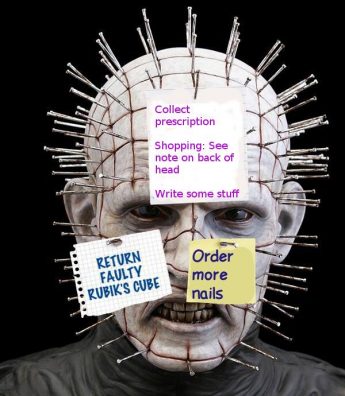THE WRITER’S LIFE
My micro-galactic voyage around the man-made universe which is the internet takes me to many places, inside the microcosm of my shared humanity. My typewriter is like a tiny spacecraft providing a window on the outside world. I can change my viewpoint and look into an infana kolonia (Esperanto for ‘Infant colony’) and sometimes I can see out.

I’ll often launch a quest for knowledge somewhere completely random on Wikipedia. From there, I’ll either dig down into a planet, or take off again to find another. Sometimes I simply land and can’t be bothered to leave.
Eventually, all of Wikipedia links back to philosophy. I’m addicted to the quest for knowledge, so it’s a good place to start, forever finding yourself back where you set off from.
As one diagnosed with Alcohol Dependence Syndrome, I’m simply labelled an alcoholic. To the casual observer, it’s easier to ignore a Band Aid than a surgical tent. As an alcoholic in any interpretation of the word, I’m an addict. As an addict, I have an addictive personality.
Without dissecting each of those (as I have on this blog over the last six years, ever since my addiction made me homeless), I happened upon something today which permits me a vague stab at explaining what that’s like to the casual observer.
Perhaps more importantly, what caused me pause for thought was how addiction might have been an invention, one which would benefit a government intent on social cleansing and selling itself as an infant colony to any other fascist dictatorship happy to acquire an enslaved nation.
And still I could go on. But I found someone who might explain the experiment in my head much better than I could. This is from a TED talk by Johann Hari, ‘Everything you think you know about addiction is wrong’.
I’m not excusing myself, but neither have I been able to make anyone who’s not an addict understand how addiction comes about:
Get a rat and put it in a cage and give it two water bottles. One is just water, and one is water laced with either heroin or cocaine. If you do that, the rat will almost always prefer the drugged water and almost always kill itself very quickly, right, within a couple of weeks. So there you go. It’s our theory of addiction.
Bruce comes along in the ’70s and said, “Well, hang on a minute. We’re putting the rat in an empty cage. It’s got nothing to do. Let’s try this a little bit differently.” So Bruce built Rat Park, and Rat Park is like heaven for rats. Everything your rat about town could want, it’s got in Rat Park. It’s got lovely food. It’s got sex. It’s got loads of other rats to be friends with. It’s got loads of colored balls. Everything your rat could want. And they’ve got both the water bottles. They’ve got the drugged water and the normal water. But here’s the fascinating thing. In Rat Park, they don’t like the drugged water. They hardly use any of it. None of them ever overdose. None of them ever use in a way that looks like compulsion or addiction. There’s a really interesting human example I’ll tell you about in a minute, but what Bruce says shows that both the right-wing and left-wing theories of addiction are wrong. So the right-wing theory is it’s a moral failing, you’re a hedonist, you party too hard. The left-wing theory is it takes you over, your brain is hijacked. Bruce says it’s not your morality, it’s not your brain; it’s your cage. Addiction is largely an adaptation to your environment.
We’ve created a society where significant numbers of our fellow citizens cannot bear to be present in their lives without being drugged, right? We’ve created a hyperconsumerist, hyperindividualist, isolated world that is, for a lot of people, much more like that first cage than it is like the bonded, connected cages that we need.
The opposite of addiction is not sobriety. The opposite of addiction is connection. And our whole society, the engine of our society, is geared towards making us connect with things not people. If you are not a good consumer capitalist citizen, if you’re spending your time bonding with the people around you and not buying stuff—in fact, we are trained from a very young age to focus our hopes and our dreams and our ambitions on things we can buy and consume. And drug addiction is really a subset of that.
Perhaps it struck me because I’m an addict, and I can only see it as something I can’t say (because other voices can explain it better).
When you’re an addict, you look into yourself constantly and to your own detriment. If someone speaks to that inner person, it might move them to use the words they heard. Sometimes you have to speak to yourself.
Maybe that might help others get it later, if they hear something the addict said to someone else. If they hear it from someone they don’t know, they can disconnect (and allow themselves to judge from a self-elevated position). I’m talking to myself, of course.
I’m a caged consumer experiment, beneath the dome of Infana Kolonia. What do you do, when you sold your soul to the devil, but you made a commitment to life?
You just keep on living I’m afraid. Sorry about that.
